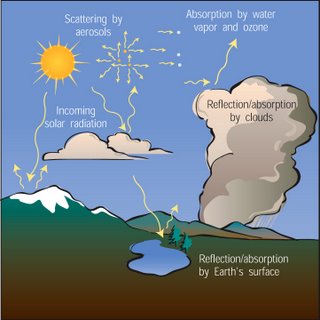
Opnieuw: het onvermijdelijke gebeurt nu.
'Tipping point: energy.
What we can do about passing the energy tipping point.
The energy tipping point has been reached, just as a system such as the climate has been found to have a critical threshold that some scientists believe has probably been reached. Obviously, climate disaster is much more ominous than the enormous consequences of passing the energy tipping point. As if it's a matter of choice, there are those who don't want to see any concerns about energy supply distract us from the climate challenge. Yet, the two crises are related and inseparable. There happens to be a common approach to mitigate each of them.
Meanwhile, the mainstream corporate press is finally hinting at limitations on the economy from the "constraints" of both climate and energy. This is heresy for free marketeers who believe in endless growth. The New York Times ran a guest editorial column on Nov. 29 that said,
The world’s supply of cheap energy is tightening, and humankind’s enormous output of greenhouse gases is disrupting the earth’s climate. Together, these two constraints could eventually hobble global economic growth and cap the size of the global economy. The most important resource to consider in this situation is energy, because it is our economy’s “master resource” -- the one ingredient essential for every economic activity. (Thomas Homer-Dixon's op-ed, "The End of Ingenuity")
When such an observation is combined with available evidence, such as overpopulation, we know that the dye has been cast, years before: economic growth will end soon, forever, on the scale the world has known. But there are those who imagine energy decline with little change in today's trajectory of technological growth and anything connected to it. They know about peak oil, but they understand it superficially.
There is almost always, like in the Times piece, the suggestion that coal will come along in a big way to provide energy. The feasibility of this, apart from climate-damage concerns, is questionable because of our petroleum infrastructure and the nature of petrocollapse. Yet, the same Times piece helpfully introduced the concept of net energy from energy extraction, and even though the issue was presented simplistically, the reality of energy decline becomes a little more apparent to the public.
The science/art of oil being supplied to the market ought to be a major consideration applied to the focus on the tightening, geological limit of crude oil. There are many other factors, such as the depletion of desirable, retrievable crude versus all categories of hydrocarbon deposits that are more and more the heavy and solid varieties. And when we look at energy alternatives, there is no evidence of their major readiness for a globally charged market -- unless we could snap our fingers and see this economy back to maybe its size of 1930, when petroleum started taking over many aspects of modern life for a much smaller population of humans and cars.'
What we can do about passing the energy tipping point.
The energy tipping point has been reached, just as a system such as the climate has been found to have a critical threshold that some scientists believe has probably been reached. Obviously, climate disaster is much more ominous than the enormous consequences of passing the energy tipping point. As if it's a matter of choice, there are those who don't want to see any concerns about energy supply distract us from the climate challenge. Yet, the two crises are related and inseparable. There happens to be a common approach to mitigate each of them.
Meanwhile, the mainstream corporate press is finally hinting at limitations on the economy from the "constraints" of both climate and energy. This is heresy for free marketeers who believe in endless growth. The New York Times ran a guest editorial column on Nov. 29 that said,
The world’s supply of cheap energy is tightening, and humankind’s enormous output of greenhouse gases is disrupting the earth’s climate. Together, these two constraints could eventually hobble global economic growth and cap the size of the global economy. The most important resource to consider in this situation is energy, because it is our economy’s “master resource” -- the one ingredient essential for every economic activity. (Thomas Homer-Dixon's op-ed, "The End of Ingenuity")
When such an observation is combined with available evidence, such as overpopulation, we know that the dye has been cast, years before: economic growth will end soon, forever, on the scale the world has known. But there are those who imagine energy decline with little change in today's trajectory of technological growth and anything connected to it. They know about peak oil, but they understand it superficially.
There is almost always, like in the Times piece, the suggestion that coal will come along in a big way to provide energy. The feasibility of this, apart from climate-damage concerns, is questionable because of our petroleum infrastructure and the nature of petrocollapse. Yet, the same Times piece helpfully introduced the concept of net energy from energy extraction, and even though the issue was presented simplistically, the reality of energy decline becomes a little more apparent to the public.
The science/art of oil being supplied to the market ought to be a major consideration applied to the focus on the tightening, geological limit of crude oil. There are many other factors, such as the depletion of desirable, retrievable crude versus all categories of hydrocarbon deposits that are more and more the heavy and solid varieties. And when we look at energy alternatives, there is no evidence of their major readiness for a globally charged market -- unless we could snap our fingers and see this economy back to maybe its size of 1930, when petroleum started taking over many aspects of modern life for a much smaller population of humans and cars.'




Geen opmerkingen:
Een reactie posten